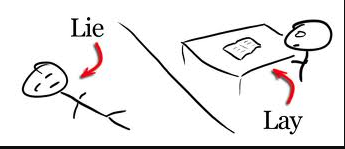Ezelbruggetjes #2 – Grammatical memory aids

In this blog more about memory aids for English grammar. Or, with another chic word, mnemonics!* The Dutch translation for ‘mnemonics’ is ‘ezelsbruggetjes’. Last time that I wrote about ‘ezelsbruggetjes’ I did that in Dutch, because mnemonics can help Dutch learners with remembering English grammar rules. And I also found out that my blog about ‘ezelsbruggetjes‘ is being visited and read by many people, also from outside The Netherlands. So, I’ll write it in English to give more people the chance to brush up some hard grammar rules. Time for part 2 of ‘ezelsbruggetjes’!
Question: How can I remember to write ‘ie’ and ‘ei’?
Answer:i before e except for c (say this sentence out loud, sing it all day long)
Examples:
- I received a book the other day.
- I retrieved all my data on my computer.
Question: How to remember the difference between its and it’s?
Answer: s after it is his. In Dutch: s na it duidt op bezit.
Examples:
- So you like it because the size (of the cup) is good? Yeah, it’s (it is) my cup of tea! [geen bezit / no possession]
- Nice cup! Its size is just good for me! [bezit / possession]
Question: What is the difference between good and well?
Answer: ‘well’ modifies the verb and ‘good’ modifies the noun (= zelfstandig naamwoord)
Examples:
Well -> verb
- I paint well.
- Did everything go well?
- They work well under pressure.
- It still runs well.
Good -> noun
- I am a good painter.
- They do a good job.
- The car is in good condition.
- That was a good show!
Question: How can I distinguish the verbs ‘lie’, ‘lay’ and ‘lie’ [not saying the truth]? They are so confusing!
Answer: True. Here are some sayings [proverbs] that may help to remember them with more ease:
To lie [in Dutch: liggen]: As you make your bed, so you must lie upon it => You have to suffer the consequences of what you do. [physically lying down on a bed]
I lie down, I lay down, I am lying down, I have lain down
To lay [in Dutch: leggen]: Don’t kill the goose that lays the golden egg! => Don’t give up on something valuable. [laying eggs (in a nest) or a book on the table] ->
I lay the book on the table, I laid it on the table yesterday, I am laying it down, I have laid it down
To lie [in Dutch: liegen]: Half the truth is often a whole lie => If you do not tell the whole truth, you can mislead people more than if you tell them an outright lie.
<- I often lie, I lied yesterday, I am lying, I have lied.
*Try to pronounce the word ‘mnemonics by not pronouncing the ‘m’ [so called silent ‘m’ and put the stress on ‘mo’.

